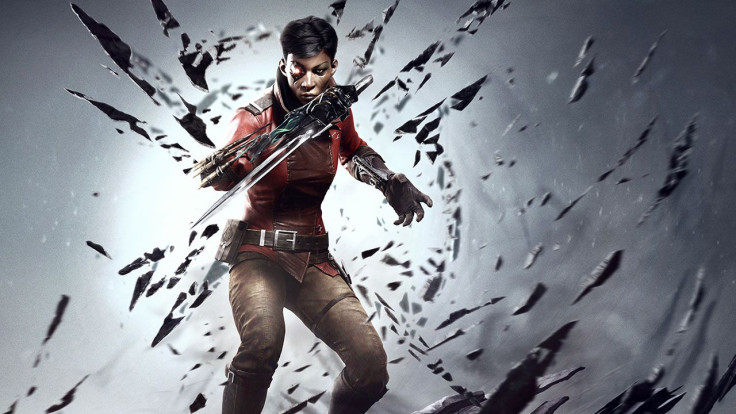NOTE: There will be spoilers for the backstory of Billie Lurk as well as Dishonored: Death of the Outsider’s ending in this review.
Dishonored: Death of the Outsider is fun. It has all the best mechanics of the Dishonored series, from the Blink-like Displace ability to familiar tricks of stealth and sightlines. The beautiful environments, entertaining abilities and weapon upgrades make another dip into the world of Dishonored, at first, a welcome one. But Death of the Outsider’s narrative and writing leaves much to be desired. Its overarching story and individual lines of dialogue all culminate in a character assassination more distasteful than any of Corvo’s deadly combos.
Our protagonist is Billie Lurk, whom we have encountered several times before in the Dishonored mythos. Billie is a straightforward character whose major emotional tie is to Daud, the assassin of Empress Jessamine, whose murder sparked the events of Dishonored.
There are several problems with making Daud the game’s emotional lynchpin. First, if you missed The Knife of Dunwall and The Brigmore Witches DLC, you’ll barely remember Daud. Second, if you missed Dishonored 2, you have no idea who Billie Lurk is or what her complicated history with Daud entails despite the story’s attempts to set you straight.
Most importantly, Daud is not someone I root for, so his struggles provide no emotional punch. Attempts to redeem him, or make me empathize with him, are undermined by the absolute fact Daud deserves what he gets. Jessamine, a loving mother and a caring Empress, was the real victim here -- not Daud. But Dishonored’s relentless focus on how very, very bad Daud feels about this one murder (out of many) would have you forget that fact.
Dishonored worked because Jessamine, Corvo and Emily were innocent victims of evil, ugly people. The more the subsequent releases focused on Daud’s feelings, the more poignancy they lost. The fact that Billie’s mission to kill the Outsider is given to her by Daud is infuriating: she’s fulfilling a desire built on Daud’s ultimate, arrogant, childish refusal to accept responsibility for his own actions. Instead of ever riposting, Billie simply nods and takes her marching orders.
But the writing fails to be self-aware about Daud’s ridiculous stance, and never has Billie provide a convincing challenge to her mentor’s delusional logic. Instead, the game vindicates Daud by making his mission your mission. Killing the Outsider revolves around Daud’s sloughing of responsibility onto the Outsider (for giving him the Mark and ruining his life) and Billie (to complete the task he won’t live long enough to do on his own). Pursuing this mission implicitly validates Daud’s position.
Story aside, the game is on sturdy footing. This standalone adventure dispenses with the need to balance murder and mercy. You can kill your way across Karnaca with no repercussions on your game’s environment and ending. Fun for a bit, but soon I found I really missed consequences. Without them, there’s nearly no need to engage in the stealth gameplay that defines the series. Mission 3 is the game’s peak, an imaginative bank heist crammed with options, obstacles and enemies.
In the final mission, you get your chance to decide the Outsider’s fate. The ending is one of the most disappointing moments I’ve ever had in a game, no matter what you choose to do with the Outsider. Death of the Outsider reminds us there is such a thing as peeling back too much mystery from a character. The secretive, enigmatic figure who lurked around the edges of all fateful events in the Dishonored series is gone, replaced with a woobified fake god who swoons into your arms like a child, stripped of all power, agency, and frankly, interest.
Woobifying the Outsider means hearing endlessly about a poor little orphan boy murdered by mean ol’ cultists with a big scary knife, forced into godhood, his true form kept frozen at the heart of the Void. Paradoxically, making his backstory explicit makes his character much weaker and erodes the impact of all his previous appearances. He’s just a widdle sad baby, after all.
Billie lampshades the disappointment I felt at all this when she finally encounters the Outsider’s mortal form. There’s no epic battle, no fight. In the end, the most interesting figure in Dishonored ’s mythos is simply pathetic. His eldritch mysteries inelegantly stripped, his future as a 4000-year-old former god in the broken world of Dishonored uncertain at best, the restoration of his mortality is inexplicably presented as the good ending.
Even the conversation where Billie tries to convince Daud to spare the Outsider is badly written: he says no, until he says yes, without any sense of persuasion taking place. If Billie kills the Outsider, her moody ruminations on how she’ll always be a killer put ‘90s grimdark to the test for cringe. Hell, even listening to the rats talk sets my teeth on edge. From concept to execution, I hate the writing in this game.
Dishonored: Death of the Outsider is a fun jaunt if all you want to do is pile bodies in a dark corner, but if you were hoping for a great addition to the lore, you’ll be sadly disappointed.
- Beautiful environments
- Fun gameplay
- Bank heist mission is amazing
- Concept is rotten
- Writing is poor
- Woobie Outsider


















